How I built and sold an AI app
I never mentioned it on the newsletter, but my entrepreneurial situation was dire last November. I had just moved to NY, my savings were running out, and I was getting desperate. I'd called several friends and told them that if I couldn't make 1 month's living expenses by the end of the year, I'd start looking for a job.
This is the story of how I built Agentboard, sold it, and worked at the acquirer until just a month ago. It still feels unreal, and in all honesty it was mostly luck. I hope that in writing this, I can reflect on how it happened and take those lessons into my next adventure.
What I learned from Athenareader
I launched my previous app, Athenareader, here last October (To recap, it turned static blogs like paulgraham.com into a daily newsletter). You may have noticed that I never wrote about it afterwards. That's because no one wanted it.
It's the most classic reason of all: I didn't build something people want. I didn't talk to potential users beforehand to validate my idea.
Here's the feedback I got at launch that I could have gotten before I wrote a single line of code: There just aren't many people who read enough static blogs to justify more email into their already crowded inboxes. Learning that simple insight earlier was doable with a few conversations and would have saved me weeks of time.
It's not that I didn't know that I should talk to users. It's just that once I quit my job, my nascent project idea was all I had for a career. I didn't want anyone to trample all over my little dream. To avoid confronting that fear, I deluded myself into thinking that if I could just ship and launch it quickly, I could skip over that pesky little step of getting to know my target market. Of course I couldn't.
The other hard thing was that I was completely alone. Alone in developing the product, and isolated from any user feedback along the way. As a result, my motivation was fleeting. I'd have to push myself late into the night just to get small amounts of work done.
Overall, the project was painful, but not devastating (eight weeks of lost time). I look at it now as spending eight weeks to cure me of my fear of talking to users. I didn't make that same mistake the next time around.
Validating My Next Idea
I packed up my life in San Diego, moved to New York, and started brainstorming again. I had a few project ideas after working on Athenareader, but I settled on building something around "AI agents." They were all the hype in November, and more importantly, I didn't really know what the term really meant. I thought building an AI agent app would help me understand it better.
To make sure people actually cared, I started posting about AI agents on Twitter. I also talked to friends about AI agents, and generally shopped my ideas around.
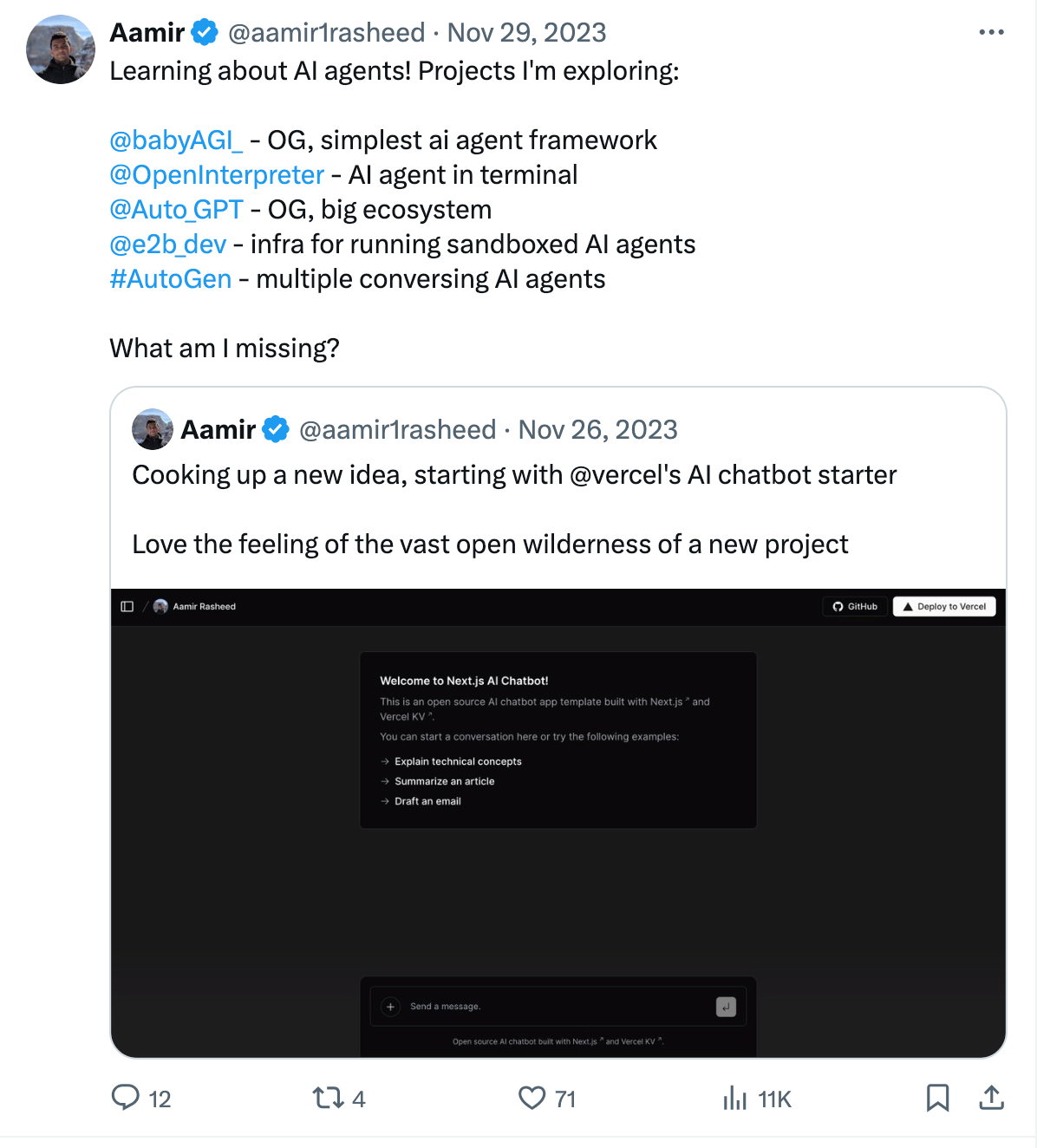
As I started playing around with the AI agent frameworks I listed in my tweet, I noticed a problem: All of them required users to clone a repository from Github and then run a framework using the command line.
This excludes everyone except developers. Nontechnical people simply don't know how to use Git or the command line. Besides, most other AI tools (like ChatGPT) are web-based and only require a login to use.
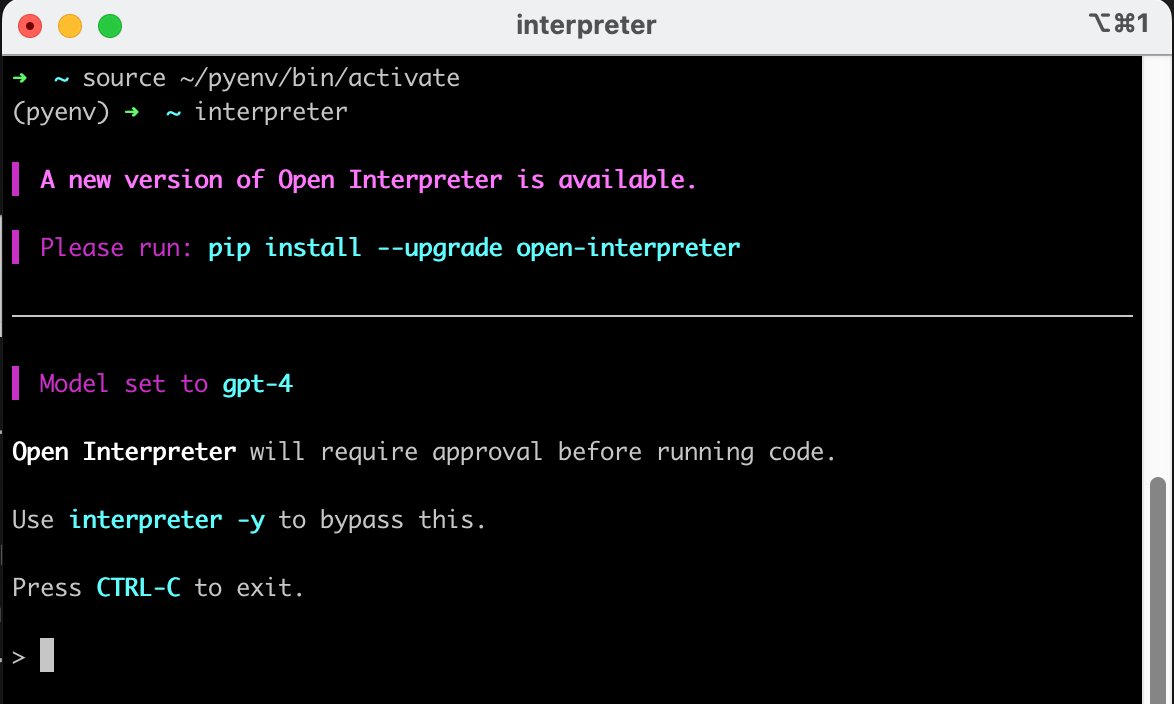
I found my opportunity in this problem. If I could wrap AI agents in a web application, could I enable the nontechnical masses to use AI agents?
Before I wrote any code, I pitched this idea to a few friends and they generally liked it. I decided to call it "Agentboard" in the hopes it would one day host all of the AI agent frameworks I experimented with.
Was this a business idea? No.
Did I have a pricing model, or a monetization plan? Nope.
Did people froth at the mouth, wondering when it would be ready to use? Nada. If anything, their positive reactions came from politeness.
But because I successfully gauged interest in the problem space, both on Twitter and amongst my friends, then validated and refined the idea through conversations, and people didn't outright reject the idea this project was already miles ahead of Athenareader. That was good enough for me. It was time to start building.
(As it turned out, someone did want to pay for the idea. Just not for reasons I could have predicted)
Development
Like I mentioned before, AI agents require a runtime to execute the code they generate. So the key addition to my web stack was E2B, a product that supplies sandboxed runtimes for code execution via an API.
As I built the project, I learned that E2B was a nascent product from a small startup based in Prague. Their product was buggy, but they were very responsive on Discord, in which I frequently posted asking for help or making feature requests. My feedback was valuable to them, and the encouragement they supplied was energizing. Sharing my ideas and progress with Agentboard was actually kind of fun compared to the lonely, grindy development of Athenareader.
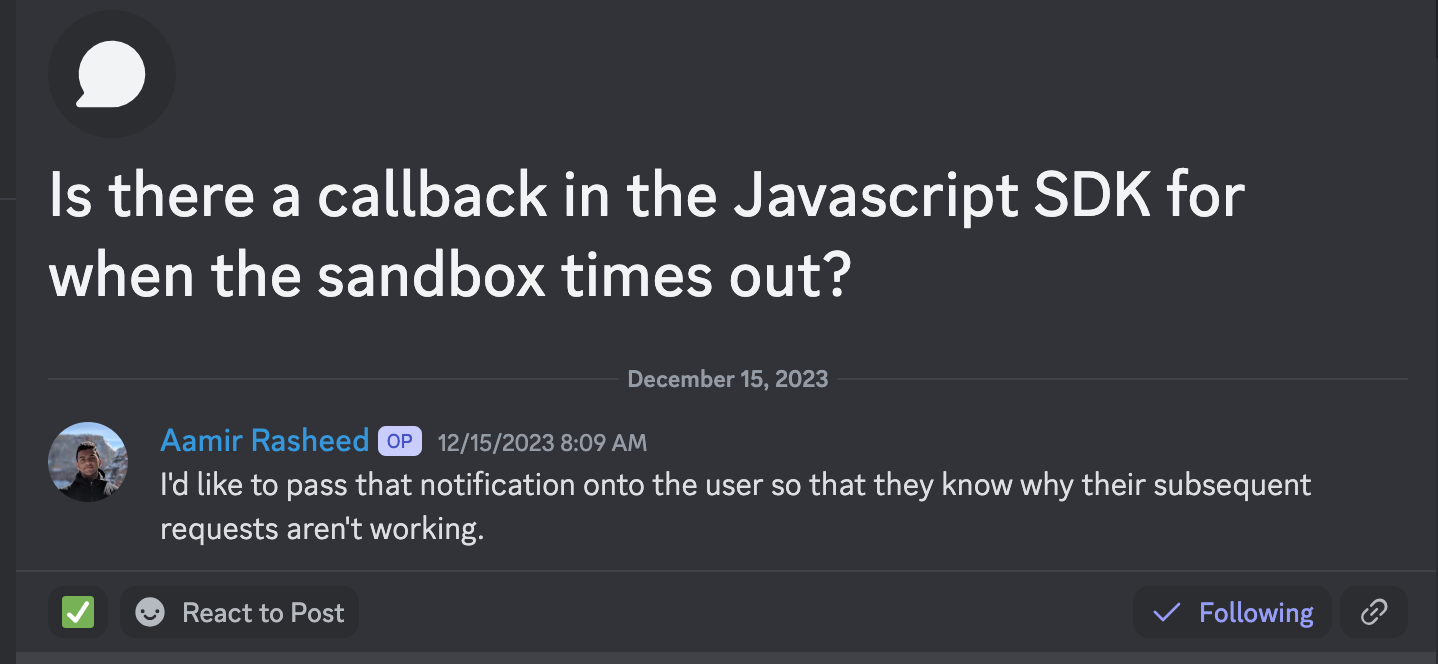
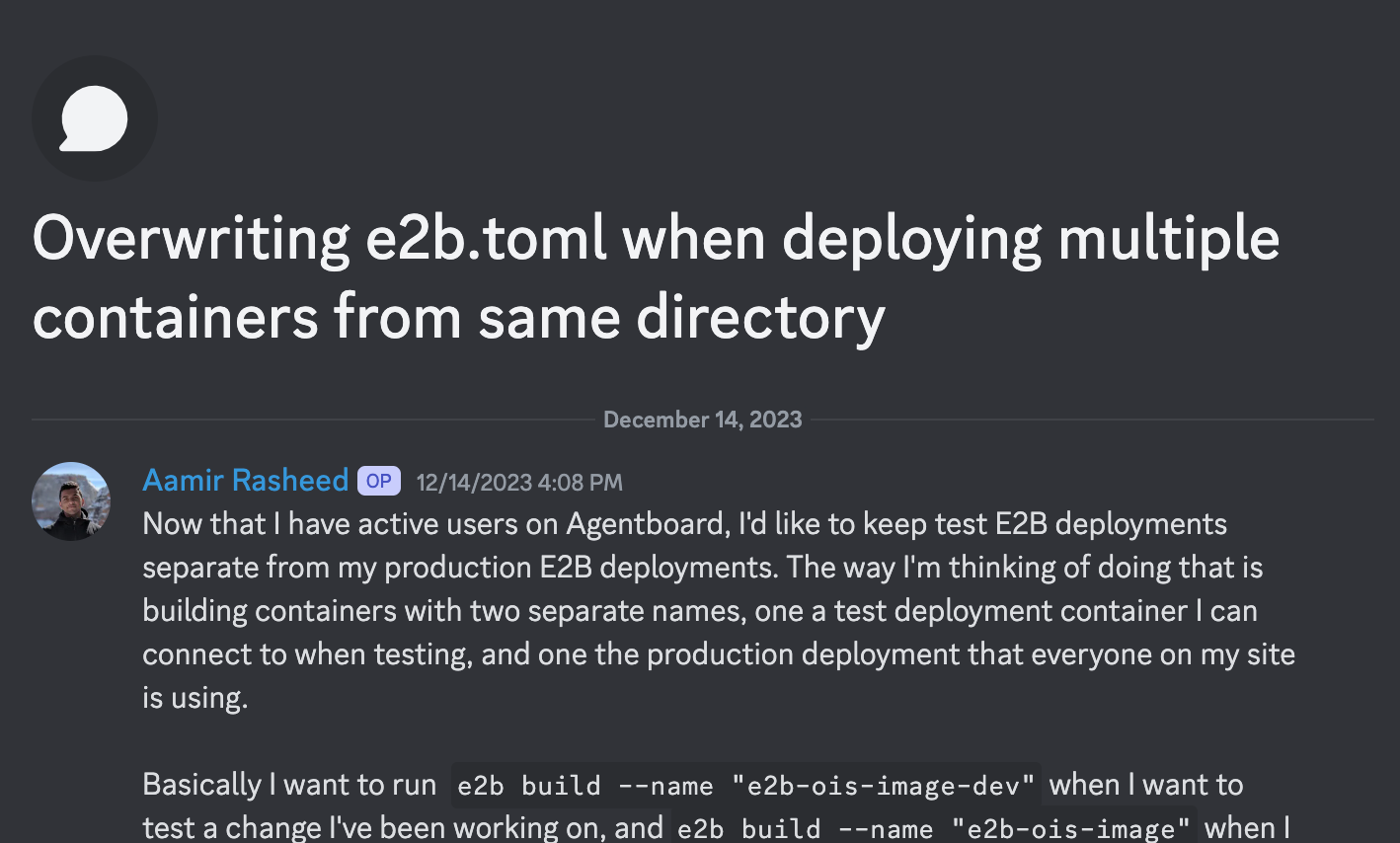
Also, I built it fast. Previous experience taught me that an aggressive deadline was the best way to ensure I actually launched. First commit to launch was two weeks, a big speedup over the eight weeks it took me to build Athenareader.
Launch
I didn't choose a particular day or time to optimize views or anything like that. I just launched as soon as I possibly could. The post did well, garnering 7000 views.
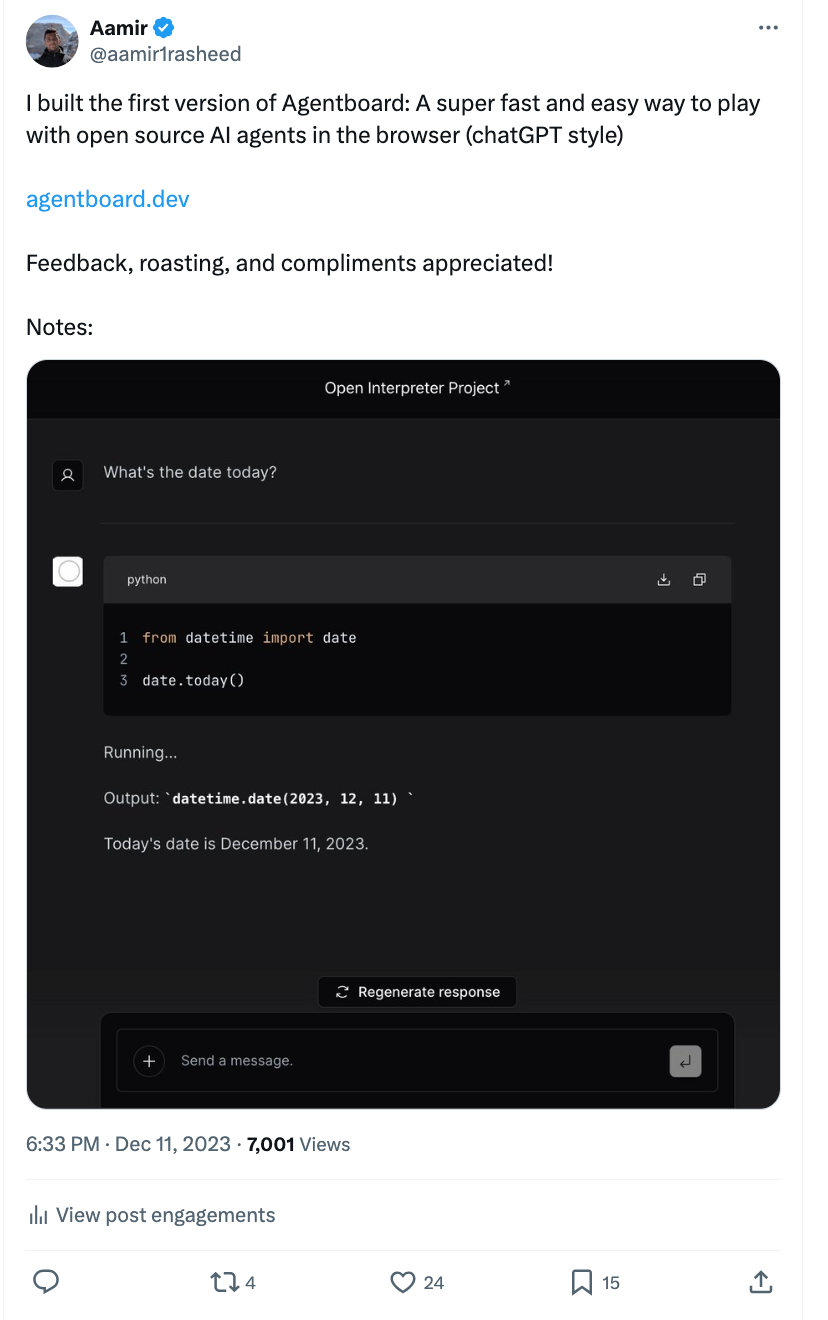
On a whim I also DM'd Agentboard to Guillermo Rauch, the CEO of Vercel because I had used one of their NextJS templates. To my surprise, he responded and gave me some product feedback! It's cool that he even responded at all.
Acquisition
Soon after I launched Agentboard, Vasek (CEO of E2B) DM'd me and asked to meet virtually to discuss the future of Agentboard. It took a few conversations but they let me know that Agentboard was solving an important problem for them: Getting developers to understand what they do and how they could build with E2B. They were interested in continuing to build Agentboard as a showcase of what's possible with E2B and AI agents. I thought about it for a while and consulted with family and friends, and ended up agreeing to sell it to them. A few weeks later, I came on as a contractor to continue building it for a few months.
It's hard to truly remember how I truly felt in that moment because it's been five months. It's definitely not as casual as I make it seem to most people. I think I was just so frayed from the constant stress of not knowing how I'd make money that it took me a few weeks to feel true joy. It wasn't a life changing amount of money, but symbolically it was such a huge win. I finally had something tangible to show for quitting my job earlier in 2023. I celebrated well in East Village that night.
Lessons
If Athenareader taught me to build something people want, Agentboard taught me that spending time harnessing luck is worth the effort. I spent little energy on making Agentboard a viable business. I put something I made in a place that others might see it. It just so happened to solve a very specific business problem for one (1) company. Serendipity and luck had much more to do with my success than the perfect business model.
From The Great Online Game:
The Great Online Game is an infinite video game that plays out constantly across the internet. It uses many of the mechanics of a video game, but removes the boundaries. You’re no longer playing as an avatar in Fortnite or Roblox; you’re playing as yourself across Twitter, YouTube, Discords, work, projects, and investments. People who play the Great Online Game rack up points, skills, and attributes that they can apply across their digital and physical lives. Some people even start pseudonymous and parlay their faceless brilliance into jobs and money.
The Game rewards community and cooperation over individualism and competition. You get points for being curious, sharing, and helping with no expectation of reciprocation. By increasing your surface area, you’re opening yourself up to serendipity. For good actors, the Game has nearly unlimited upside, and practically no downside.
Yes, I was lucky, but increasing my surface area for luck was no accident. Social media apps are rightly criticized as the attention-sucking pastimes they are, but they are also the most powerful idea distribution tool ever invented. Posts are cannonballs, and the recommendation algorithm is a cannon that launches your ideas to the exact people most interested in what you want to show or say, for free. I utilized its power to put my ideas in front of people, and luck struck: I had only spent 24 days building my app before the deal was signed.
I also have to keep in mind that luck can strike just as suddenly in the negative as in the positive. As longtime readers of this blog know, a shower door exploding and cutting open my arm was not on my bingo card for 2023.
But I'll take the good luck when I get it. I'm proud that I sold something that I built. I'm proud that I can call myself an entrepreneur now, for real! I'm proud that I achieved the goal I started this post off with.
And I'm glad I learned this lesson about luck, because I'm going to need a lot more of it to get to where I want to go.
Member discussion